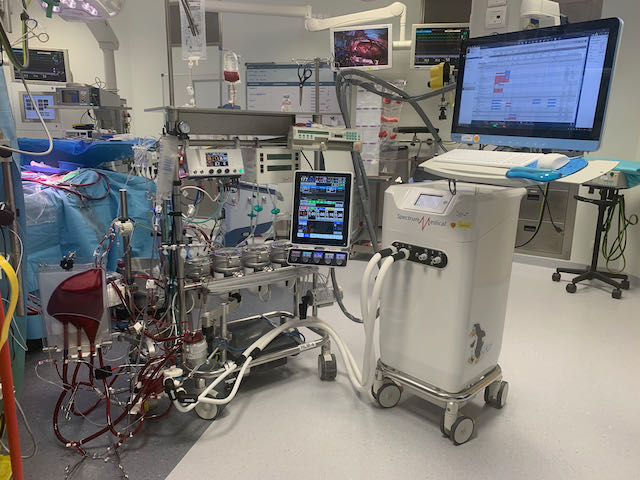Extracorporeal Circulation

Extracorporeal circulation, or more specifically Cardiopulmonary bypass (CPB) is a technique that temporarily takes over the function of the heart and lungs during surgery, maintaining the circulation of blood and the oxygen content of the patient's body. The CPB pump itself is often referred to as a heart–lung machine or "the pump". Cardiopulmonary bypass pumps are operated by perfusionists. CPB is a form of extracorporeal circulation. Extracorporeal membrane oxygenation is generally used for longer-term treatment.
Historically, the most important task of a clinical perfusionist lies in the extracorporeal support of the human circulatory system during cardiac surgical interventions. These procedures require the take over of heart and lung functions by means of a heart-lung machine for the duration of the surgical procedure.
The chosen extracorporeal support technique, the choice of material but above all the knowledge, skills and experience of the clinical perfusionist are factors co-determining the operative result, recovery and quality of life after surgery.
Our group of perfusionists is highly trained and very experienced. Together we have performed approximately 30,000 extracorporeal circulation procedures in support of cardiac surgical procedures. On average our partners have an experience of 20 years as clinical perfusionists.
We are not only experienced in terms of numbers of performed procedures but also in the diversity of techniques we can apply and the great variety of materials and equipment we are accustomed to work with. We have a broad experience using mini-ECC systems, like for instance the Medtronic Resting Heart System. For our partner ‘de Isala Klinieken’ we developed our own miniaturized system, which is used on a routine basis. Techniques like extracorporeal circulation without the use of cardiotomy suction, mini bloodcardioplegia, antegrade cerebral perfusion techniques, deep hypothermic circulatory arrest, kinetically supported venous drainage etc. are applied by us on a routine base.
Use of the above mentioned techniques, using systems and individual components that are coated with a biocompatible coating, prevention of mixing damaged and activated blood from pericardial and pleural cavity's with the patients systemic circulation and an aggressive policy with regard to the prevention of using donor blood products are key elements of the expert treatment of the more and more aging cardiac surgical patient.

Robotic surgery
ECCare takes part in the ro- botic surgery program of Isala Heartcentre. `
Isala Heartcentre is the first to be using the daVinci robot in cardiac and pulmonary sur- gery. It offers potentially many advantages to the patient like:
• smaller incisions, less pain and therefore reduced ex- posure to anesthetic an pain medication
• reduced bloodloss and need for donor blood transfusions
• reduced risk for infection
• shorter hospital stay, faster
• recovery to normal day live
• less scarring
